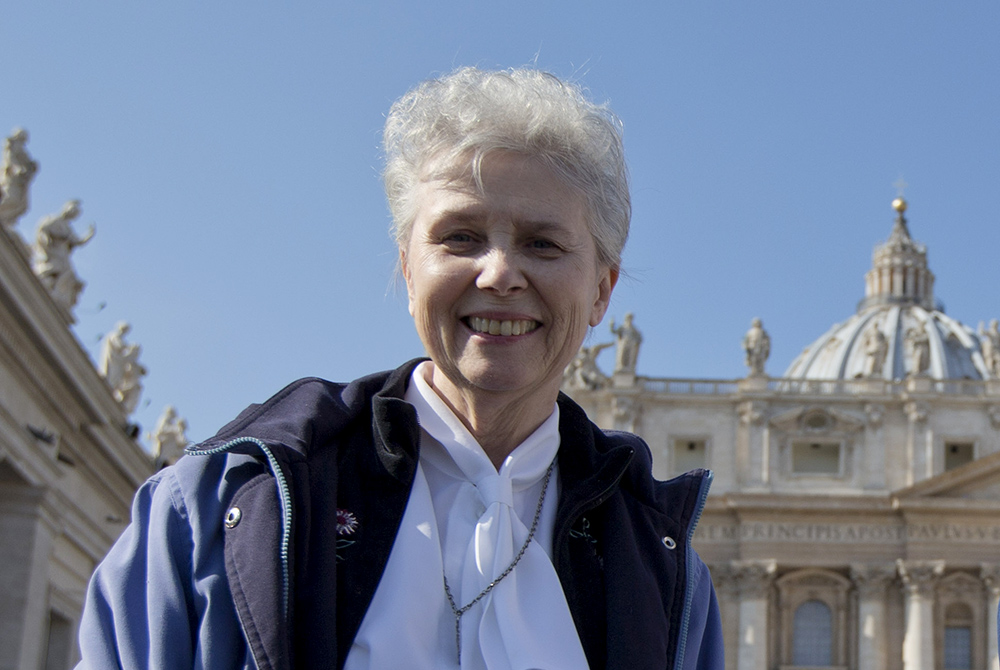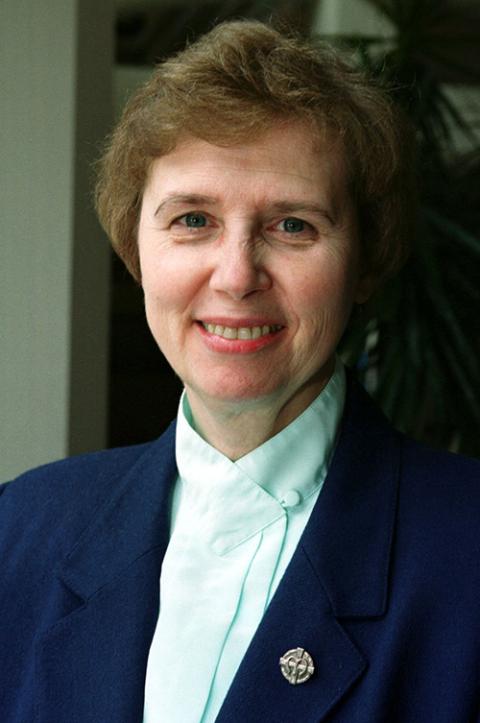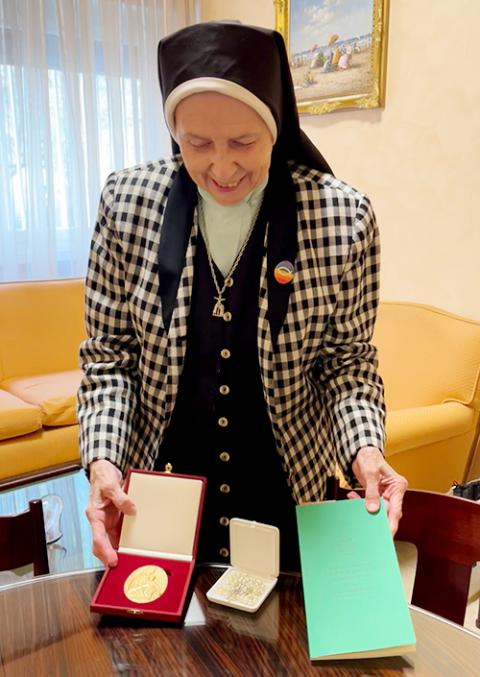
Loretto Sr. Jeannine Gramick poses for a photo in front of St. Peter's Basilica at the Vatican, after she and New Ways Ministry pilgrims attended Pope Francis' weekly general audience Feb. 18, 2015. (AP/Andrew Medichini)
Jeannine Gramick just had a friendly meeting with the pope.
In the not-too-long-ago, that might have been the punch line to a bad joke or a way of emphasizing that something was impossible.
But Jeannine Gramick, a Loretto sister and a co-founder of New Ways Ministry, which advocates for LGBTQ Catholics, did in fact just have a friendly meeting with the pope. (Hear more details about the meeting here.)
It was no joke. It was, indeed, proof of what is possible with enduring faith, a disposition toward others that emerges from the heart of the Gospel, and a resilience that is beyond extraordinary. That last bit, resilience, always borne with incredible grace in the face of the utterly brutal treatment she received from church authorities in the past, is breathtaking.
At the same time, and I've known Gramick for a long time, I am no longer surprised at her resilience, her faith, her persistence, her endurance, her unfailing generosity, her capacity to absorb the institutional assaults and remain hopeful.
I am surprised that, finally, a pope gets it. Francis in previous correspondence with New Ways praised her work and wrote, "I know how much she has suffered. She is a valiant woman who makes her decisions in prayer."
In that not-too-long-ago, in 1999 to be precise, I was privileged to be in the room when Gramick, having recently gone through an inquisition conducted by two American cardinals and an order to discontinue her ministry from a pope-to-be, told a startling tale. She followed the tale with a bit of wisdom that was, given the audience of the moment, jarringly prophetic.
Her talk occurred at the end of a period during which Gramick has described as feeling like "a battered woman."
It was following a nearly two-decade investigation ordered by Rome and carried out mainly in the United States. That investigation led to an order to be silent about her ministry and to disengage from New Ways.
The Vatican pressured her original religious order, the School Sisters of Notre Dame, to silence her as she gained stature and credibility around the country. That forced her to move to the Loretto Sisters.
She never agreed to be silent or discontinue her work. She said she would work to have the order overturned.
Against that background, she told the crowd at the Call to Action conference about her chance meeting with then-Cardinal Joseph Ratzinger, who had overseen the investigation and the punishment. He would eventually become Pope Benedict XVI.
A year before the final ruling, she had visited her then-superior in Rome, who suggested the two travel to Munich to pray at the grave of the order's founder.
As they boarded the plane, Gramick noticed a man who looked like Ratzinger, though he was not in clerical garb. She took the seat next to him, which was open, and began to chat. She asked if he was a priest and he said yes. She told him she was a School Sister of Notre Dame from the United States.
Advertisement
He said he knew the order because his father's sister was a member. Gramick asked her name.
He responded, "Ratzinger."
She then identified herself as Sr. Jeannine Gramick.
"Ah, I've known you for 20 years," Cardinal Ratzinger responded.
They went on to have a conversation that she described as "delightful," one that covered her past as a mathematician and her conviction about the church's need to minister to gay and lesbian Catholics.
The chance meeting occurred after years of requests to meet with Ratzinger as the investigation was ongoing. "But that's not part of the process," she told the gathering.
She refused to say anything negative in her address. "I believe he was doing what he thought was right, just as I was doing what I think is right," she said to an assembly that, it would be fair to speculate, included many who would find her kind assessment of Ratzinger difficult to swallow.

Sr. Jeannine Gramick in the 1990s (CNS/Nancy Wiechec)
I normally avoid the term "prophetic" like the plague because I think it is widely and wildly misused, but I think in this instance it applies. Gramick in 1999 was speaking truth both to power and to the wider community — in each case truths that were difficult to hear.
In reporting that event, I wrote that despite the sanctions imposed on her,
... she urged her listeners to refrain from "demonizing" those who are on opposing sides of issues. The meeting, she said in a later interview, "put a human face on the institution" and convinced her that she "can't let ideological differences put a distance between Catholics." She said she "can't attribute unworthy motives" to those who oppose her. "They are just as sincere as we are."
Instead, she said, Catholics "have to raise up how processes within the church don't reflect human values." People should work, she said, to change the structures that prohibit dialogue and end up excluding people who challenge authority.
And that is what she's done. In all of the conversations I've had with Gramick, the thousands of words I've both written and read about her and by her, I think that her moment before the Call to Action gathering was the best self-definition of who she is and how she chooses to live.
In her plea to others not to "demonize" opponents, Gramick was not advocating a cotton-candy or naive approach to human relations. She was not suggesting that people abandon convictions in order to avoid conflict. She was admonishing the community (and by extension, those in charge) to respect the other even in disagreement, to give others the benefit of the doubt when assessing motivation.
The persistence with which she worked for church reform is the same that she has displayed in her commitment to those who were marginalized, whose sexuality was described as disordered.
She has arrived at the point, once almost unimaginable, of thanking a pope "for his openness to blessing same-sex unions."
All joking aside, Jeannine Gramick apparently had a really good meeting with the pope.









